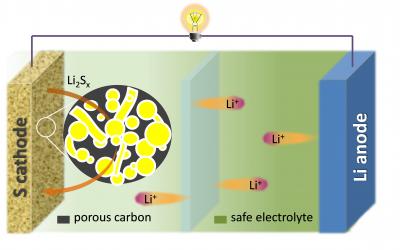
IMAGE: Lithium-sulfur (Li-S) batteries have attracted much attention for its high energy density, low cost and environmental friendliness. However, they suffer from short life cycle, low columbic efficiency, and safety issues….
view more
Credit: Author
How should one design porous carbon materials for advanced Li-S batteries cathodes? What electrolytes are extensively studied for high-safety Li-S batteries? In a paper published in NANO, a group of researchers from Qingdao, China have reviewed the recent progresses in sulfur/carbon cathode materials and high safety electrolytes towards advanced Li-S batteries. Some potential issues and possible developmental directions are also discussed.
Lithium-sulfur (Li-S) battery is one of the most promising secondary batteries for its high energy density, high natural abundance and environment-friendly nature of sulfur. However, the commercial application of Li-S battery faces some technical obstacles, such as low cycling stability resulted from the shuttle effect of polysulfides, low electrical conductivity of sulfur, and volume expansion during charge/discharge process. Furthermore, due to the flammability of organic solvents in liquid electrolytes, the continuous formation of lithium dendrites and the low ignition temperature of carbon-sulfur mixtures, the safety of Li-S batteries has become another critical issue to be solved.
In recent years, many different strategies have been put forward to improve the electrochemical performance and safety of Li-S batteries, containing the development of carbon/sulfur composite cathodes, design of flame retardant electrolytes and protection of negative electrodes. In this review, the challenges and trends of Li-S batteries are first discussed. The recent progress of sulfur/carbon composite cathode materials for Li-S battery is then introduced in detail. Then the evaluation methods and latest development of high-safety electrolytes towards advanced Li-S batteries are summarized. Finally, the development trends of Li-S battery are forecasted. Although some issues in Li-S batteries are still unknown or contradictory, its mysterious veil will be gradually revealed with further in-depth research.
Additional co-authors of the paper are Chen-Liu and Yue Gao from the SINOPEC Safety Engineering Institute, Jin-Mei Zhang and Ya-Qin Wang from the National Registration Center for Chemicals, Ministry of Emergency Management of the People’s Republic of China.
For more insight into the research described, readers are invited to access the paper on NANO.
###
IMAGE
Caption: Lithium-sulfur (Li-S) batteries have attracted much attention for its high energy density, low cost and environmental friendliness. However, they suffer from short life cycle, low columbic efficiency, and safety issues. Through summarizing and outlining the effective strategies to solve the above challenges, in this review, the recent progresses in the sulfur/carbon cathode materials and the corresponding high safety electrolytes towards advanced Li-S batteries are presented. Some potential issues and possible developmental directions are also discussed.
NANO is an international peer-reviewed monthly journal for nanoscience and nanotechnology that presents forefront fundamental research and new emerging topics. It features timely scientific reports of new results and technical breakthroughs and publishes interesting review articles about recent hot issues.
About World Scientific Publishing Co.
World Scientific Publishing is a leading independent publisher of books and journals for the scholarly, research, professional and educational communities. The company publishes about 600 books annually and about 140 journals in various fields. World Scientific collaborates with prestigious organizations like the Nobel Foundation and US National Academies Press to bring high quality academic and professional content to researchers and academics worldwide. To find out more about World Scientific, please visit http://www.
For more information, contact Tay Yu Shan at [email protected].
TDnews














